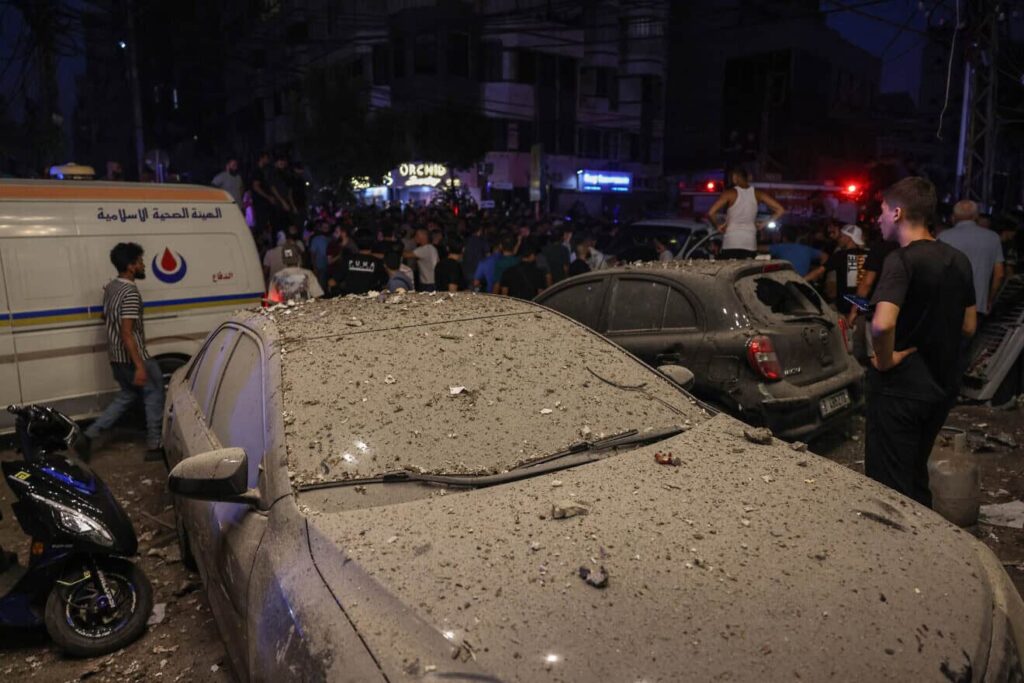
Israel kills Hezbollah mastermind behind Majdal Shams attack, 1983 Beirut bombing
Fu’ad Shukr served as a senior “military” adviser to Hezbollah Secretary-General Hassan Nasrallah.
An airstrike by the Israeli Air Force in Beirut on Tuesday night killed a top Hezbollah commander responsible for Saturday’s rocket barrage that killed 12 children in the Golan Heights, as well as a 1983 bombing that killed 241 U.S. troops in Beirut, the Israeli military confirmed.
The attack targeted Fu’ad Shukr, a senior member of Hezbollah’s Jihad Council, which is subordinate to the Shura Council and is under the direct control of terrorist leader Hassan Nasrallah, the IDF said.
“Today, July 30, 2024, in a targeted, intelligence-based elimination, Israeli Air Force fighter jets eliminated the Hezbollah terrorist organization’s most senior military commander and the head of its Strategic Unit, Fu’ad Shukr,” the military announced in a statement.
Shukr “directed Hezbollah’s attacks on the State of Israel since Oct. 8, and was the commander responsible for the murder of the 12 children in Majdal Shams in northern Israel on Saturday evening, as well as the killing of numerous Israelis and foreign nationals,” the IDF added.
Shukr, also known as al-Hajj Mohsin, served as a senior “military” adviser to Nasrallah and played a central role in the planning and execution of the U.S. Marine Corps Barracks bombing on Oct. 23, 1983, in the Lebanese capital, which killed 241 U.S. service personnel.
Shukr was sanctioned by the United States in 2015. Two years later, the U.S. government offered $5 million for information on his whereabouts.
Lebanon’s state-run National News Agency reported that the strike had hit near the building of Hezbollah’s Shura Council, which determines the Iran-backed terrorist organization’s key policies and strategies.
The White House was reportedly informed ahead of time about the strike. CNN reported that the heads-up was conveyed by Jerusalem through “security channels” but did not say when it was given.
Shukr’s fate remained unclear in the initial hours after the strike, which caused a large blast in the southern Beirut Hezbollah stronghold of Dahiyeh.
“Hezbollah crossed a red line,” Israeli Defense Minister Yoav Gallant wrote in a post on X after the attack in Beirut.
In a later statement, issued after the IDF confirmed Shukr’s death, Gallant said that he had “the blood of many Israelis on his hands.”
“Tonight, we have shown that the blood of our people has a price and that there is no place out of reach for our forces to this end,” he stated.
Immediately after the strike, Jerusalem’s Israeli Prime Minister’s Office published a picture of Israeli Prime Minister Benjamin Netanyahu and National Security Adviser Tzachi Hanegbi meeting in Jerusalem.
The prime minister subsequently made his way to the Kirya military headquarters in Tel Aviv, where he held a security assessment with the participation of Gallant, Hanegbi, Israeli Strategic Affairs Minister Ron Dermer, Mossad head David Barnea, Israel Security Agency (Shin Bet) chief Ronen Bar, IDF Chief of Staff Lt. Gen. Herzi Halevi and other top military officials, Netanyahu’s office said.
The IDF’s Home Front Command announced that the guidelines for citizens remained unchanged in the wake of the retaliation. “If any changes will be made, an update will be released,” the army said.
A senior Israeli official told Bloomberg no further IDF military action against Hezbollah should be expected at this moment.
‘The State of Israel cannot let this pass’
Twelve children were killed and more than 40 people were wounded in Saturday’s rocket strike on the Golan Heights Druze town of Majdal Shams, marking Hezbollah’s deadliest attack on Israel since Oct. 7.
In addition, one Israeli civilian was killed when a Hezbollah rocket hit a home in Kibbutz Hagoshrim in the Galilee panhandle on Tuesday. The victim was identified by Israeli media as local resident Nir Popko, 28.
During a visit to the site of the attack in Majdal Shams on Monday, Netanyahu vowed a tough response to Hezbollah’s deadly attacks.
“With Iranian backing, Hezbollah attacked here with an Iranian missile, taking the lives of 12 pure souls,” the premier said. “These children are our children; they are the children of all of us. The State of Israel will not and cannot let this pass. Our response will come, and it will be tough.”

(Source: JNS)
Hezbollah has vowed to respond forcefully to any Israeli military action against it, irrespective of the scope of Jerusalem’s retaliatory attack.
“Foreign envoys suggested we don’t retaliate to any strike so as not to expand the conflict … [but] we will respond,” a senior Hezbollah terrorist told Qatar’s Al Jazeera channel earlier on Tuesday.
“The leadership of the resistance is in a state of complete readiness and will decide the form and size of the response to any potential aggression,” the terrorist official said. He warned that Hezbollah is capable of attacking army bases in the Golan Heights and Haifa area.
The post Israel kills Hezbollah mastermind behind Majdal Shams attack, 1983 Beirut bombing appeared first on Israel365 News.
Israel in the News